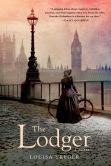 I was excited to devour Elizabeth Little's Dear Daughter, as before-publication reviews were calling it the next Gone Girl. Um...not quite. There are a multitude of reasons why I just didn't care for this book, but I'm only going to mention a few of them.
I was excited to devour Elizabeth Little's Dear Daughter, as before-publication reviews were calling it the next Gone Girl. Um...not quite. There are a multitude of reasons why I just didn't care for this book, but I'm only going to mention a few of them.Dear Daughter is narrated by Janie Jenkins, a woman convicted of murdering her mother but released from prison on a technicality. Since Janie was considered a socialite and an IT girl, the trial transfixed the country. Janie is determined to find her mother's "real" killer, and in so doing, finds herself in a small town in the middle of nowhere. The American media is just as determined to keep tabs on her since they are convinced she got away with murder.
A.) I pretty much hated every character in this book. None are likable, and it is extremely hard to feel any sympathy for any of them. From Janie herself to her horrible mother to Leo the cop, I would not give any one of them the time of day in real life.
B.) Since Dear Daughter is narrated by Janie, the reader is forced to see the unfolding mystery through her eyes. Therefore, we are treated to such doozies as Janie getting shot in the shoulder and saying that red is just not her color. What???? What about screaming? Crying? Passing out? Which is what 99.9% of people would do if they were shot in the shoulder.
C.) The mystery is just plain boring, and the ending (when we finally find out who the killer really is) borders on a Scooby Doo revelation.
So Gone Girl this is not, but I'm going to give it a 2. Read it if it's the only book in the house.
MY RATING - 2





